

January's Featured Writer: Ben Ladouceur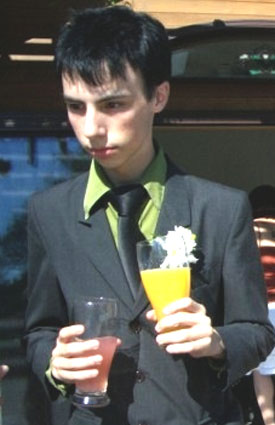 Ben Ladouceur has recently published a chapbook with In/Words. He is a regular contributor to the magazine (read his poem slate in our most recent issue) and is a student at Carleton in Humanities. To get your hands on a copy of his recent work, email us for a copy. Ben Ladouceur has recently published a chapbook with In/Words. He is a regular contributor to the magazine (read his poem slate in our most recent issue) and is a student at Carleton in Humanities. To get your hands on a copy of his recent work, email us for a copy.First off, the William Miller question: What do you love about writing? I think it's the ultimate bare-bones art. It doesn't require anything, it doesn't require electricity or pencil crayons or a guitar. A poem can be composed in your head without even being written down, so it's like the most basic form of expression for the human mind. You recently published a chapbook of your own writing through our press, Three Knit Hats. If asked what it was about, what would you say? All the poems are addressed to men -- it's a book of good and bad and okay dates. I tried to touch subjects that aren't very poemed, for instance I find that I write a lot about emotions like boredom and awkwardness. More generally, the book is about lost contact, the way you still have things to say to someone even after you've stopped talking, for whatever reason. That's why things like close-by cities and the Internet are mentioned so frequently in the book. Anyway, I hope it's entertaining. Which city is better: Toronto, Ottawa, Montreal or Kingston? (and Toronto and Kingston don't count) and what makes it so important to you personally? I like them all. I declare a four-way tie. I have a pretty romanticized and glazed-eyed impression of Toronto, Montreal and Kingston, so I get really meaty (and impressionable) writing out of trips to them. As for Ottawa... Ottawa is a pretty okay place. A few of the poems in Three Knit Hats were written on Greyhounds to or from those cities, and a few others are about people who currently live in those cities. It seemed fitting and cool to dedicate the book to the cities themselves. You mention instruments quite often in your work. How much would you say music inspires or influences your poetry? I'm just always listening to music, or playing crappy music, and spending too much money on CD's and reading Pitchfork Media too often. So it comes up a lot in writing. Instruments in particular are fun and useful to write with; I just like to mention different instruments as a way of evoking moods and thoughts. If you had the chance to have dinner with one famous person in all of history, who would it be? And if you could invite two others for company, who would they be? I would have dinner with Yoko Ono and nobody else is invited. If you could be immortal—never die, and remain healthy in this form for as long as you want, but be impotent, would you do it? I think that happened to a kid in a Goosebumps book... it didn't work out for him. And I don't want to do anything that R.L. Stine doesn't approve of. I don't know if the kid went impotent, though. I'll have to write R.L. Stine a letter and ask. What's the next project for you? Three Knit Hats was all about men, and (I think) it's fast-paced and admittedly moody because of that. Now I'm working on a collection of poems about women, and these poems will be a lot more obvious -- they won't put on a front. Aside from that I'm playing with some ideas for a story or two, and this week, I'm writing a renga with a high school friend on our Facebook walls. Facebook! Ben Ladouceur may be reached at benladouceur@gmail.com. Photo by Carmel Firdawsi. November's Featured Writer: Dave Bennett 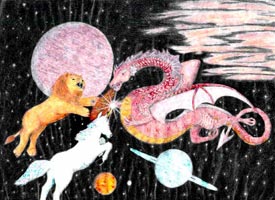 Dave Bennett is a regular In/Words contributor and a talented smart-ass. His sense of humour and delivery never fail to entice audiences at open mics. Check out his most recent contribution to the magazine, a story entitled The Fastest Runner in the World. Dave Bennett is a regular In/Words contributor and a talented smart-ass. His sense of humour and delivery never fail to entice audiences at open mics. Check out his most recent contribution to the magazine, a story entitled The Fastest Runner in the World.First off, the William Miller question: What do you love about writing? I thought about answering this question two ways: the ironic, "Writing is the double-double in my coffee," too-clever-by-half way, or something pretentious about the creative vision. The truth is, I like that writing can be both, how literature can change the world or just make it a little more tolerable a place to live in. I like how writing can simultaneously bare the soul and hide it behind symbolism or irony or layers of distorted meaning. If I could accurately describe why I love writing so much, I wouldn't write so much. What I seriously love is staring at a blank Word document (the 21st century's answer to a sheet of paper) and asking myself, "What do I want to talk about today?" The discourse with myself can get heated. You're taking part in NaNoWriMo this month. What can you tell us about the novel you're writing? The novel I'm writing features a coffee shop blowing up, a fake dead whale, an accordion, Quebecois conspiracies, the word 'aglets,' and a joke about Pierre Trudeau and the final scene of Return of the Jedi - you'd have to read it to really understand that one - and I'm only about a third of the way through writing it. I tried writing it last November but gave up, and hopefully this retry will be seen through to the finish. When finished it will be twelve chapters long and contain many run-on sentences. And his best friend is a talking pie. What would you title - and subtitle - your autobiography? "A Life of Procrastination: I Banged This Entire Autobiography Out In Five Or Six Hours Before My Deadline." No, not really. The title really depends on what I focus on in the autobiography. "Salad or Soup With That?: Adventures with my B.A. - English." What was your most traumatic childhood experience? A gorilla tried to kill me when I was six years old, at the zoo. I made eye contact with it, and it charged at me and bounced off the Plexiglas separating us. Nature and I have had an adversarial relationship ever since. You've been hired as director/screenwriter for a live action adaptation of short-lived 80's cartoon Jem. Which actress do you cast as the lead singer of The Holograms? I'd pick Kristen Bell, star of "Veronica Mars," the first two seasons of which I watched in a matter of days on my computer despite all of my friends saying I was gay for watching it. Or Jessica Simpson, bless her dumb heart for trying so hard. It must be hard to cast for a hot blonde with a singing voice, huh? I've heard of this one recent divorcee from Louisiana that could use a career jumpstart. Maybe the role could help her out. (In lieu of sending in a picture of himself, which the author only finds self-aggrandizing and boring (the same two eyes, right where they are on everyone else's face? Yawn), the author presents this much more kinetic and inspiring image of a lion and unicorn fighting a dragon in space.) October's Featured Writer: Jeff Blackman 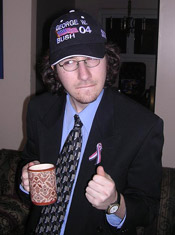 Jeff Blackman is a Carleton University student whose work has been published consistently in In/Words magazine. His latest chapbook, Mumble Something Pink, illustrates his offbeat humour and potential for greatness. Email us for a copy. Jeff Blackman is a Carleton University student whose work has been published consistently in In/Words magazine. His latest chapbook, Mumble Something Pink, illustrates his offbeat humour and potential for greatness. Email us for a copy.First off, the William Miller question: What do you love about writing? It's the least skill-demanding art form there is. Honestly, it's something anyone can do. I used to draw a lot (I still sketch and doodle) but I didn't have the patience for all the study and such. Now I know that's a bit of a stretch, that there are lots of self-taught guitar players and painters, but all you need to write is an active inner monologue. I love writing because I can take all the ideas shooting around in my head and put them to the page without spending hours at the canvas. I love writing because I can do it on the bus. You've authored some of the most controversial material In/Words has ever published, some of it Carleton-centric. Last year you attacked the Percy campaign in a piece, and submitted another that poked fun at University students. Are you enjoying University? Haha, yes, I do love University. It makes me think; it stimulates. I was genuinely concerned some of the Percy folk would make trouble last year, that I'd wake up one morning to a subpeona at the door for libel -- two years of journalism will do that to you. What I really love about University is that it's just filled with people looking for truth and it isn't all nice & clean. There's real conflict, real fierce debate. I think writing is a great way to get your voice heard. Which, leading into your next pre-planned question... You have a slight speech impediment that you yourself have written very humorous poetry about. Is your writing style affected when you know you'll be reading a piece out loud? Honest to G-d, almost everything I say aloud I say a-quiet in my head. I always have to think before I speak. As I write I'll stop and read what I've just written aloud to see how it sounds. It helps me figure out how it flows, how the words play off one another when some other person may read them (or me to someone else). Answering your question, I try to ignore my voice when I write. Though I'm sure a thorough analysis of the average number of words I use with the letter 'R' versus the number of words with 'R' in the English language could produce some interesting findings. If you could make out with one literary figure from history as long as he/she promised to call you the next day, who would it be? Well, I went to see a poetry reading in Toronto a couple of summers back featuring one of my favourite poets bill bissett and met a poet from New York named Adeena Karasick. I bought her book and asked her to sign it for me. She thought we'd met before and when I read the signature after she'd written, "for Jeff, with the beautiful eyes". She was a great performance poet -- probably the best poet I've ever seen perform. And she was a beautiful woman. So her, or William Burroughs. But he sure as hell wouldn't call the next day. Haha. Last question, Jeff: are you going to change the world? I've typed out two answers to this question and backspaced them both. Interview with Rich Terfry, aka Buck 65 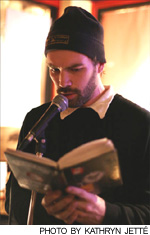 Rich Terfry likes to tell stories. His spoken word set on November 23rd, 2005 had the artist dipping deeply into his bag of anecdotes and scenarios based on his own music, his collection of odd gifts and mementos, and a small book full of his thoughts in the written word to a packed house for the better part of an hour. The set saw Rich speak his mind on a range of topics covering everything from the politics of the music business to encounters with supermodels, from the scarf his father made for him to the fan response that removed a song from his live catalogue. David sat down with Rich after all was said and done to discuss writing, dreams and the peculiar hobbies of Vincent Gallo. Rich Terfry likes to tell stories. His spoken word set on November 23rd, 2005 had the artist dipping deeply into his bag of anecdotes and scenarios based on his own music, his collection of odd gifts and mementos, and a small book full of his thoughts in the written word to a packed house for the better part of an hour. The set saw Rich speak his mind on a range of topics covering everything from the politics of the music business to encounters with supermodels, from the scarf his father made for him to the fan response that removed a song from his live catalogue. David sat down with Rich after all was said and done to discuss writing, dreams and the peculiar hobbies of Vincent Gallo.This is Rich Terfry, and he just did a phenomenal spoken word set at The Avant-Garde Bar. The first thing I wanted to ask you was why you decided to do this. There are a few different angles on it that I was thinking of, and I don't know if it played out exactly the way I was thinking about it, but this past summer I played at a lot of folk festivals, and being there at a folkfest, playing outdoors, sometimes in the daytime and so on, I noticed that there was a whole other audience there that I never see in a bar on a Friday night. And when I thought about those people, and there was a lot of great people who came up to say hello, it occurred to me that they were probably just not the kind of people that would go out to bars on Friday nights. Maybe the volume is just too much, or the vibe, or whatever. I'm talking about people who are maybe a little older, or maybe a little younger in some cases, or just a different strokes for different folks sort of thing. So I thought I would like to have the opportunity to play or do something outside of that environment. That was the first line of thinking, but also I decided that there were so many other kinds of writing or ideas or just things that I wanted to talk about. I suppose that's kind of self-indulgent or probably a lot of other dirty words that you could throw at it, but I wanted to do it. I feel like I've got other cards to play that I was interested in playing, and it's a challenge to do that kind of thing, kind of terrifying. I like to scare myself once in awhile. There are just certain things that you can't really get away with at your normal rock show, like reading out of a book as much as maybe you'd want to, or certain stories that you can't get away with. I love telling stories, so I guess I was just looking for a good forum for storytelling. I think the storytelling comes through really strongly in your music, but I was wondering if you felt at all limited by the medium that you're choosing to adopt. It has its limits built into it, but I try really hard to ignore those and not let it limit me. I've taken it on as a real challenge. For example, I can remember years ago I was hanging out with a friend of mine, sleeping on opposing couches, telling stories with all the lights off. And I was telling him the story of an ex-girlfriend of mine, one that I alluded to briefly tonight. But I kind of told him how the story ended, which was really sad. And he said, "That is an incredible story!" And years later, we decided to make a record together, and he said, "Look, here's what I want you to do." He was kind of playing the role of producer. He said, "What I want you to write, in the songs, is that story you told me that night on the couch in Cincinnati. So I said, "Okay, I'm gonna do it." And I got structure to work with in there. But I did it, I told the story. All the details were in there, the beginning and the end was in there. So I didn't let it constrain me. I think it's possible to tell a story coherently when it rhymes. That can be a real challenge because it limits the words that you can drawn on in certain cases, but I find it never ceases to amaze me how well that works out sometimes. Often the rhymes are perfect. I'll have a line that ends with this, and you think, "Okay, what's going to rhyme with it?" and then you think of the words that rhyme and you think, "My God, these are perfect words. They work for the story." I don't know why that happens over and over again. It seems like divine coincidence or something. One of the things I've always wondered about you from listening to your music is how much of this stuff you have floating around in your head, and what it does to you when you're trying to write a song. Well, there's a certain degree of mania. I don't know what to call it. It's almost uncomfortable sometimes. I told the story in as subtle a way as I possibly could. It's a pretty depressing thing to say, but writing has been my alternative to suicide a few times, you know what I mean? Some people, when they're having a hard time or just have too much on their mind, turn to drugs or sex or God knows what other kind of indulgence to make their brain relax, to leave them alone. For me it's been the pen every time. It's what's kept me going. Like I was saying when I was reading tonight, sometimes I'll be on an airplane and it will hit really bad turbulence and I'll get really scared. I'll start thinking about my life, and think, "Man, what if we crashed right now?" And I'll ask myself, "Is that okay if we crash right now? No, man! I've got songs to write. I can't die right now." As sad as it is to say, that's basically the one thing I'm thinking in that situation. It is my biggest and strongest reason to be living right now. And it's the want. I think my work is important, but there's something that I'm trying to write that I haven't written yet, that I've got to before my time is up. And I don't know what that's even going to look like or sound like when it's done, but it's what I've dedicated my life to. My favorite track on your new record is Surrender to Strangeness, where you talk about the pen having a mind of its own. I think a lot of people who write can identify with that. Yeah, it's funny. I think a lot of people like us, or people who write and just think a lot, we all have the tendency to think that a certain idea comes to us and we're the only person who ever thought of that, and it's so deep and dark that you're afraid to talk to anybody else about it. We're all like that. There's an English bookstore right across the street from where I live in Paris, which is a nice convenience for me. It's a great spot of some renown in Paris. Just a couple of weeks ago, Greil Marcus came in there to speak, who has been writing about music since the 60's. He's written a lot of books about Bob Dylan. So I thought, "Great, I'm going to go to this reading for sure." So I sat down. Really small room, way smaller than this space here. Tiny. So I was sitting right next to him, and he described a situation where he's written lines, and he's watching them emerge on the paper. He'll write a line and look at it and say, "Who wrote that? That didn't come from me. I don't know where the heck that came from." I've felt that a couple of times too. I've seen the pen moving, and it's almost unconscious, like, "Where the hell is this coming from?" And two times, there are two songs I have no memory of writing whatsoever. It's like I found the paper filled up with words that I recognize in my handwriting, and I knew somehow that it belonged to me, but I don't remember it. And I actually remember very little of the entire process of making the album Vertex. When I listen to that album, there's just really something strongly atmospheric about it. It has a kind of an atmospheric grounding that I don't think any other record I've made since has. There's something almost spooky going on with that record. And I think that's what's got to be at the heart of it, because I don't even know what was going on when I made that record. Granted, it was a dark and very terrible time in my life, where those sorts of events might be more likely to happen. You wrote some great things about baseball on that record. Yeah, which is deep in my bones, so those sorts of things would come out of me in a subconscious way. I have a lot of dreams about baseball. I'm also really attached to my bicycles. I always have been. I have two right now, and one that I built with my bare hands. I'm very proud of this bike. I had a dream last night that I went in to some place and didn't lock it up, and some guys took it. When I came back out it was gone. And I saw a guy riding a bike later that looked a lot like mine. It wasn't exactly like mine, but it basically looked like someone had chopped it up and just kind of turned it into some kind of diseased, inbred version of my bike. It was weird, but all my parts were there. I could see it. I was so mad. I was yelling at these guys, "What did you do to my bike? Give it back!" The crossbar was cut, so the bike was really wobbly. So I threw a rock at the guy who did it, and I went after him. I followed this guy and he went to where there was a whole bunch of guys, probably about eight of them. It was actually on the corner just down the street from where I grew up, just a place in my hometown. There was about eight or nine guys throwing rocks at me, and I started throwing rocks back. I thought I could take them all on, but I couldn't. I'm attached to my bike, and I'm really cocky about my ability to play baseball. Take your average person. If I just stand here, about 200 feet away, if they try to hit me with a rock they're probably going to miss because it's not easy at that distance to hit something. There would probably be a lot of luck involved. But I feel completely confident to hit anything from 200 feet with a rock or anything else for that matter. So I thought, "I'll just sit here and one by one I'll pick them off with rocks." But a lot of these rocks were hitting me, and they were big. So I fled. That was my dream. What do you think it means? It probably doesn't mean a whole lot, you know, just this deep thing inside me of having this strong attachment to my bicycles and baseball. It sounds like you're afraid of style theft or something like that. I don't know. I mean, yeah, the fact that the bike was made by my hands and it was destroyed… sort of having my property taken away from me. Yeah, maybe there is a little something interesting here about that. I think you might be right. 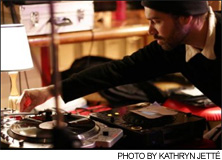 This guy behind the camera got me into your music. It was the song Pants on Fire. This guy behind the camera got me into your music. It was the song Pants on Fire.Oh yeah, Pantalons Flambés, they call it. I've got a lot of memories and stories attached to that song. Here's the story: my best friend for a really long time was a girl, and some people have this belief that in reality guys and girls can't be friends, because there's always going to be something, y'know, sexual in the way of it. But I don't believe that theory. This girl was my best friend. And then I heard from one person to the next, a three degrees of separation kind of thing, that really throughout all those years she felt that secretly I was in love with her, and she felt sorry for me. What the hell? That just undermines a lot of things that were super important to me, because I thought you were my best friend. That was a real crushing thing. And also around the same time, there were a couple of other really weird things that were happening with people who were close to me that just kind of blew my mind, because, y'know, "I thought I knew who you were! But knowing what I know now, I feel like I never did at all. You were always close to me, and you were a stranger the whole time." So the song kind of became generally about that. There are lines here and there, this line refers to that friend, and this one refers to that one. So that was that part, and interestingly enough, on the original version of that song on the album, there was a long sample from a film called Buffalo '66 at the end. That's what I wanted to ask you about, because that's what really turned me on to the song and to your music. Buffalo '66 was a favorite movie of mine at the time, and I thought it was amazing to hear that bit by Vincent Gallo at the end. I was wondering how much films and books and all sorts of different media really influence what you have to say in your music. It influences a lot, I mean, I took the time out tonight during my moment there to single out and direct people to stuff outside of what I was doing. There were three films that I wanted to mention: the Ingmar Bergman film, the Terrence Malick film and the Carné film. It's more of a well that I draw from than anything else. A while after (Man Overboard) came out, I was checking my email one day, and I saw in my inbox the name "Vincent Gallo." But people all the time out there just kind of pick someone else's name for Internet use, so I didn't think for a moment that it was actually Vincent Gallo. But I opened it up and I read the mail, and it was. And so when I read the first line or two I thought, "I'm toast. He's suing me because I didn't get permission to use that sample." But lo and behold, it was him saying, "I love your record, I'm a fan and I'm flattered that you used this thing." And I took that as a humongous compliment, because not only was I a fan of his work, but I had heard that he hated everything. He didn't like anything; no music, no films, no actors; there was little that he liked. So it was a big compliment. Long story short, we've been actually pretty good friends ever since. He's been a very inspiring guy. A lot of his motivations and ideas when it comes to his art are very similar to mine. There have been times where I've kind of been feeling bad about something or whatever else. I'll call him up and say, "Hey man, I'm kind of feeling weird about this or that." And he's always been there to give really good advice, or inspiration, or whatever. This is a guy who was been in a band with Jean Michel Basquiat, who knew Andy Warhol. Plus, he's made a lot of incredible art. So, y'know, a good guy to have in your corner. He must be a really interesting guy. He's an interesting guy. He's selling his sperm on his website. This is the magazine that ended up publishing four of your pieces. It's published through Carleton University. We don't sell it. We were glad to help you set up a show. I'm glad we had the chance to get something organized. I've had some weird and interesting experiences making a life out of this kind of work. It's certainly not glamorous, like I talked about tonight. I'd say I'm making a living or that it's my job, but it's not making me any money or anything like that. But it is giving me something to do, and it's something that holds a lot of spiritual currency, which means a lot more to me than money. Because also, like I said earlier, that idea of being conditioned to think that being poor is bad, that there's no dignity in it - I'm fine with it. I've had the opportunity to meet some people that I admire, and to have access to some really strange things. You're doing strange things with your work, and people seem to really enjoy what you're doing. You've got a room full of people here who are supporting you. Yeah, I mean, how weird. I just try not to think about that, because if I did, I'd find that to be pretty freaky. But on the other side, I'm a guy that owns a couple of pieces of Charles Bukowski's mail. Which is weird. I own mail, with the envelope, with him having filled out his return address. Stuff like that. I look at my bookshelf once in awhile and I think, "Why do I have this dead man's mail?" Well, why do you have a pack of matches that you got at the hotel where you saw Helena Christensen? Well, as I said in a little thing I wrote a couple of years ago called "15 Minutes to Live," I'm not a packrat, I'm an archivist building up archives, what I believe to be important cultural archives. Whether or not these matches will prove to be valuable or important to anyone in the years to come, who's to say? But there might be the odd item or two in there that might be interesting. I don't know what it is, why I feel this need to attach a physical object to a memory or whatever, because if I lost this book of matches I'm sure I would never forget that moment that I shared with a supermodel. But it's a memento, and when I found it in a box a couple of days ago, having not seen it in years, it brought it all back. It made me feel good inside. Put a smile on my face. And that's enough. That's what it's there for. Yeah. I've got a lot of crap. But it's stories, right? And that's pretty much the reason for it. It's what I'm looking for. Are you planning to write a book at all? I've been trying to write a couple over the last little while, a novel and a book of verse or whatever you want to call it. I just need some free time to finish, and I'm hoping to be able to do that in this coming new year. Slowly but surely, it's coming together. For more information on Rich including how to get ahold of his albums and lists of his inspirations, visit http://www.buck65.com. |